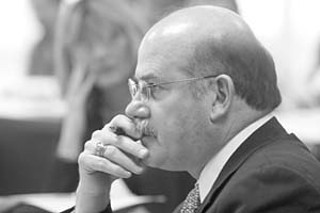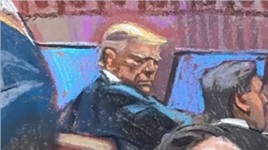In Search of Intelligent Life at the SBOE
The State Board of Education reviews biology textbooks, and the battle over evolution rejoins.
By Michael King, Fri., Sept. 19, 2003

The Sept. 10 public hearing of the State Board of Education devoted approximately 12 hours (1pm to 1am) to discussing whether the high school biology textbooks proposed for state adoption are sufficiently critical of evolutionary theory to please those folks who believe that teaching evolution is part of the secular humanist plot to get God out of the schools. This was the second of two hearings; the board is scheduled to make its decision in November. The new state budget slashed the Texas Education Agency's textbook funds by $226 million (more than a third), but the biology texts, once approved, are expected to be purchased -- most other new textbook purchases have been postponed until at least 2005.
A decade ago, the state's biology teachers were finally allowed to acknowledge what the biological and geological sciences have taken for granted for a century -- that the evolutionary theory of natural selection is the best available scientific explanation for the origin and variation of biological species. The state's official science curriculum (Texas Essential Knowledge and Skills, or TEKS) now requires the teaching of evolution, although TEKS provision No. 112.43.3(a) -- known familiarly as "3(a)" among textbook warriors -- adds that the student should learn to evaluate the "strength and weaknesses" of scientific explanations.
By law the board can now only correct "factual errors" in proposed textbooks, so anti-Darwinians are attempting to use "3(a)" to argue that the proposed biology texts err by failing to include sufficient negative analysis of evolutionary theory. Currently prominent among the anti-Darwinians is the Discovery Institute, a Seattle-based conservative think tank that avidly propagates "intelligent design" theory, which presumes that complex organic structures could only have come about by the intentional workings of some external intelligence -- that is, a God. Their critics -- which include the education watchdog Texas Freedom Network (www.tfn.org) and the newly formed Texas Citizens for Science (www.txscience.org) -- say that intelligent design is not a scientific proposition but a metaphysical one. They call it "creationism in a lab coat," and indeed the institute's long-term project is (in its own words)"to reverse the stifling dominance of the materialist world-view, and to replace it with a science consonant with Christian and theistic convictions."
That's not a cause, however, they can explicitly advocate in a textbook hearing; instead, they decry "censorship" of anti-evolutionary views. The board, viewing the 150 or more registered witnesses already on hand, decided to save a few minutes by accepting only written testimony from non-Texans. The folks from the institute were put on hold, and their arguments had to be carried by Texas allies, including some of the 40 Texas "scientists" who had recently signed a less-than-ringing institute statement calling for "careful examination of the evidence for Darwinian theory."
Many of those who signed are either not scientists or not biologists; several are Christian polemicists. The first signer is Raymond Bohlin, who has a UT-Dallas Ph.D. in molecular and cell biology, but is currently the executive director of the Probe Ministries, a Richardson-based evangelical group for whom he lectures on creationism. He told the board that he resented not being considered a "real scientist," and that all of the proposed textbooks were insufficiently critical of evolutionary theory. The second name on the list is David Shormann, who holds a Texas A&M Ph.D. in limnology (the study of freshwater ecosystems). Shormann teaches creationism at Tomball Bible Church and sells science and math CDs to home-schoolers. His Web site declares, "Dr. Shormann believes that God created the Earth in six 24-hour days, because the Bible tells him so!" The Institute list is hopelessly vague on credentials, but a number of the signees have similar résumés.
Overwhelmingly, the testimony of practicing scientists and science educators, as well as that of ministers, parents, and other citizens, supported the textbooks. It's not yet clear if that will be enough to defend the books from the 15-member board. Several have already made apparent their personal hostility to evolutionary theory, but others seemed inclined to leave scientific matters to the scientists. Don McElroy, the Bryan dentist who represents District 9, brought his own show-and-tell poster board attacking evolution. But the books were amply defended by the scientific heavyweights in the room. Perhaps the brightest star was UT physicist and Nobel Laureate physicist Steven Weinberg, who told board members that they should see their responsibility as analogous to that of judges who would not admit purported evidence of "witchcraft" to the consideration of a jury, any more than the board should ask students to determine the current scientific consensus in biology. Weinberg said the knowledge embodied in evolutionary theory reflects the "overwhelming consensus" of biological scientists.
Later, Weinberg was asked about the anti-evolutionists' arguments that they are only advocating for "more" or "better" science. "Their discussion of the supposed weakness of evolution rests on a fallacy about the way science works," Weinberg said. "Scientific theory is never regarded as certain; it's continually confronted with testing, asking if it can explain what we can see in nature. That work is never finished. There are always some things left that haven't yet been explained. That's true of physics as well as biology. ... This work goes on and on -- it's not a weakness of the theory. I don't regard it as a weakness of my own work that it hasn't explained everything in elementary particle physics."
To Weinberg, the real agenda of the anti-Darwinians is apparent. "Even though their arguments did not invoke religion, I think we all know what's behind these arguments. They're trying to protect religious beliefs from contradiction by science. They used to do it by prohibiting teachers from teaching evolution at all; then they wanted to teach intelligent design as an alternative theory; now they want the supposed 'weaknesses' in evolution pointed out. But it's all the same program -- it's all an attempt to let religious ideas determine what is taught in science courses."
Transcripts of hearing testimony, along with related info, can be found at the Texas Education Agency Web site.
Got something to say on the subject? Send a letter to the editor.








